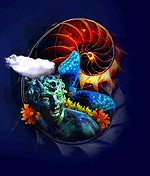|
|
Tarantella
Rebecca Loudon
Ravenna Press
ISBN Number: 1-9723329-8-7
Reviewer: Jeannine Hall Gailey
Tarantella, the edgy debut collection from Rebecca Loudon, depicts vividly the dance between pain and joy in the vocabularies of music and medicine. The fierce language of Loudon’s narrators belies deep vulnerability and a fear of the body, but an even stronger, somehow curative passion for the pleasures life offers.
The word “Tarantella" refers to a vigorous Italian dance that was believed to cure a disorder, “tarantism," which, according to popular legend, was caused by the bite of the tarantula. The book is separated into three sections, “The Bite," “The Dance," and “The Cure." Many of the speakers in Loudon’s poems seem to be suffering from epilepsy--or a similar disorder of mind and body--although the many references are oblique. One narrator is bitten by a spider on the toe; another steps on a nail; still another wades through antidepressants, tranquilizers, and sleeping pills. From the poem “Apothecary":
Every morning she places pills in tiny saucers...names each pill, tumbles them like prayer beads.// Valium, when winds are pinned...She stacks Soma like pillows or dainty rounds of bread...
Two clues to reading the text are the first stanza of the collection’s opening poem, “Instructions for Recalcitrant Patients," which begins: “Are you having a seizure?/ I’m recovering from a spider bite/ by embracing the tarantella..." and then the second poem, “Uncertain Geography," which concludes with the lines “pristine as a fugue flutters in her temporal lobe, that ecstatic little ping, the aura of seizure."
Although Loudon writes mainly in a lyric vein, she sometimes veers into experimental territory, which seems appropriate given her offbeat subjects: one poem, “Darlene Reads Her Future in Fortune Cookies," consisting entirely of odd, ill-omened cookie fortunes, typed into rectangular squares that scroll across the page like bits of white paper. Other poems mention stuttering and have a stutter-type effect, repeating small bits of a line over and over. Still other poems contained numbered lists, words in parentheses separated from the rest of their lines, or a series of words, seemingly unconnected, followed by stanzas. These different strategies appear to further Loudon's primary goal of communicating fractured, numerous, unruly trains of thought.
Food-oriented poems are laced throughout the collection, often involving pears, and heavy with the invocation of healing, love, sex, and heartbreak. For instance, in the wonderful prose poem “Warning Signs:"
No. Her name is Renate. She cooks chocolate torte, brioche, coq au vin, spiced pears. Her husband watches from behind the panty door, watches, watches, groans, leans into his palm. Renate tips the roasting pan into the sink, lets the pink blood run out.
Another evocative use of the language of food, this time in a poem of mourning called “Comfort Food":
Later I brought casseroles;
white sauce and baby peas
soaked in butter,
soup that snapped with tiny carrot fingers,
plump turnip hearts.
Loudon’s references to music often similarly connotes love and passion, as in the poems “Kit Kat Club" or “Coda," although music appears in her poems about brokenness and loss as well. Mentions of musician and musical terms slip in and out of almost every poem in the collection, and these often reminded me to think of how the accomplished lyric poet operates often as an accomplished musician does-- improvising rhythms and repeating riffs, using certain phrases that elongate and recur throughout the work to keep the listener intrigued.
Personas recur throughout the book; a woman named Margaret, specifically, although the cast of characters is wide and includes Patsy Cline and Clara Schumann. The character’s stories are all similarly perilous; in “St. Lucy," a girl plucks out her own eyes and serves them on a plate; the poem “Swing" seems to be describing a suicide; in “Music for Piano, 4 Hands" (one of my favorite poems in the book) a woman named Rayleen may or may not have been in a fatal car accident. A couple of stanzas from that poem:
One night Rayleen got drunk, fell asleep
with her glasses on fell
asleep in her car, fell asleep
no, no, through the windshield.
Rayleen, who left a box of oranges on my porch,
Rayleen, who braided my hair, Rayleen,
who wrapped my wrists. Rayleen,
who held me when I seized on the flightline...
Loudon vacillates between poems about characters, the named and unnamed “she," and poems in the first person, leading the reader to suspect that the writer wants to say something about fractured or multiple personalities, how the “I" can’t be pinned to simply one of the many personas she presents.
Loudon’s ability to evoke emotion while keeping the reader in a sense of surreal, suspended out-of-timeness, her ability to balance the strange and the familiar, and her grace when it comes to employing the musicality of language make this collection a must-read. Loudon succeeds where many “experimental" or “post-avant-garde" poets fail by leading the reader to experience a connection to each of her narrators. Also, one cannot help but appreciate the overall arc of her collection, the wild, frenzied dance of each of her poems.
|
|


